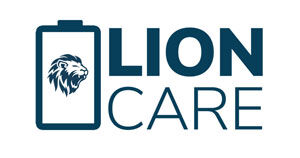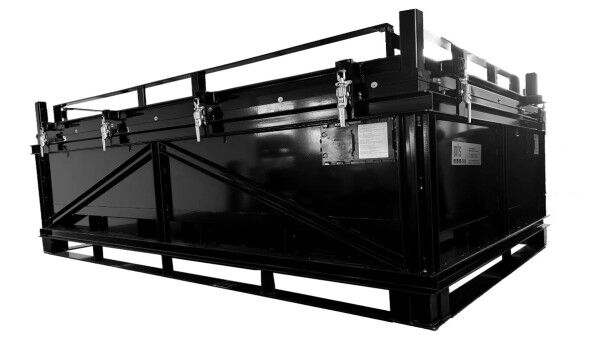Free shipping (Germany, mainland)!
Shippingtime: ca. 10 Wo.
- Article no: MTSVG1LIIO

Questions about the article?
Our staff member Petra Fürbeck is happy to help you:
+49 (0) 7151 - 256 4817 or info@lion-care.com
| max. net dangerous goods mass: | 89 - 111 kWh / 1000 kg |
| Handling the filling material: | Filling material in cushions |
| Material name: | Stainless steel tray with mts granulate |
| Packaging group: | Packaging group I |
| Packaging instructions according to ADR: | LP 903, PI 908, PI 910, PI 911, LP 904, LP 906 |
| ADR special provision: | SP 310, SP 376 |
| UN packaging code: | BAM 15854 |
| Areas of application: | Outdoor storage, see specification BAM 15854, critically defective lithium-ion batteries, Waste disposal, Workshop, Prototypes |
| External dimensions: | 2850 x 1850 x 1345 mm |
| Filling material: | mts granules |
| Internal dimensions: | 2600 x 1600 x 500 mm |
The LiioBox presented here was developed and tested for the worst case scenario for lithium-ion batteries: critically defective. The LiioBox therefore offers the perfect solution for defective or critically defective lithium-ion batteries. All requirements for the transportation and storage of critically defective lithium-ion batteries are met.
Please note that the box is black!
Size and capacity of the battery transport container
The LiioBox for critically defective lithium-ion batteries has external dimensions of 2850 x 1850 x 1345 mm. The dimensions inside the transport box are 2400 x 1500 x 500 mm. The maximum permissible capacity is between 89 - 111 kWh and 1000 kg, depending on the type. This container is therefore primarily used for industrial applications. Industrial trucks can drive under the container. The LiioBox also has a stackable design. The lid can also be lifted with a forklift truck.
Stress test passed - the box meets the strict requirements for transporting critically defective lithium-ion batteries / lithium-ion rechargeable batteries
During the tests, the thermal reaction of the ignited battery inside the LiioBox reached temperatures of over 1200 °C at its peak. The outside temperature, on the other hand, was less than 100 °C during the entire reaction time. With these results, the LiioBox meets all requirements for the safe transportation and storage of critical lithium-ion batteries.
The LiioBox also has a specification for the transportation of damaged or defective lithium-ion batteries from the Federal Institute for Materials Research and Testing (BAM 15854) in accordance with packaging regulation LP 906. We will be happy to provide you with this on request.
Optimum safety thanks to the double-walled housing and special granulate
The collecting basin consists of an e-insulated stainless steel tray filled with mts granulate. The insulation between the outer tray and the casing is patented and unique on the market. The granulate is filled in a total of 20 small bags, which are included with the box on delivery. Handling with the cushions makes loading and unloading the filler very easy. The cushions generate hardly any dust during loading and unloading. The container also has a flame arrester and overpressure protection in the event of degassing.
Other versions possible
The LiioBox can also be manufactured in other sizes on request. There is also the option of installing both battery temperature monitoring and GPS localization. If you require this, please do not hesitate to contact us.
Certification and guidelines
Lithium-ion batteries and lithium-ion rechargeable batteries fall into dangerous goods class 9, which means that the goods pose a risk to the environment during transportation that should not be underestimated. Numerous specifications and guidelines must therefore be observed when transporting lithium-ion batteries / lithium-ion rechargeable batteries. The LiioBox transport box has been specially designed for the strictest safety regulations.
Meets the guidelines of ADR / packaging instruction LP 906
All lithium-ion cells or batteries and lithium-metal cells or batteries that have been damaged and no longer comply with the applicable regulations according to their manual must comply with the provisions of this special provision. This applies, for example, to cells that have leaked or degassed, have suffered external or mechanical damage or have been identified as defective for safety reasons or could no longer be diagnosed prior to transportation. If it is determined that the lithium-ion cells or batteries could be prone to rapid decomposition, dangerous reaction, flame generation, dangerous heat generation or dangerous emission of toxic, corrosive or flammable gases or vapors under normal transport conditions, these defective cells must then be transported in accordance with packing instruction P 911 or LP 906. These packaging guidelines in turn prescribe packaging group I.
During a possible damage to the lithium-ion battery, the surface of the package must never exceed 100°C. Only short-term temperature peaks of up to 100°C are permitted. Only short-term temperature peaks of up to 200°C are permitted. No flames may form outside the package and no splinters may escape from the package. Furthermore, the structure of the package must be maintained at all times and a gas management system must ensure pressure relief inside.
If you would like to use the container for the transport case "critically defective" in accordance with LP 906, please contact us to obtain the corresponding procedure specification for this transport case: info@lion-care.com or +49 7151 256 4811 .
Also for packaging instruction LP 904 (non-critically defective), and LP 905 (prototypes) according to SV 310, SV 376
Of course, it is also possible to use this system to transport (non-critically) defective lithium batteries in accordance with LP 904 and prototypes in accordance with probe instruction SV 310 and packaging instruction LP 905. Please contact us if required.
Also ideal for transporting as-new lithium-ion batteries in accordance with LP 903 and as a storage and quarantine box
As no filler is required, the container is also ideal as a quarantine container for defective batteries in order to isolate a possible fire from the outset. Thanks to the hazardous goods approval, the defective battery can be transported away directly. In addition to defective batteries, transport containers are also suitable for the regular shipment of new goods in accordance with packaging regulation LP 903.
About mts Maschinenbau GmbH
Since its foundation in 1996, mts Maschinenbau GmbH has stood for innovative products and the highest quality of load carriers for automation. Since 2016, the company from Mengen (Baden-Württemberg) has also been developing transport solutions for both intact and defective lithium-ion batteries. in 2020, mts Maschinenbau GmbH is one of the TOP 100 most innovative medium-sized companies in Germany. Production sites are located in Mengen (D), Chesterfield (USA) and Swiebodzice (PL).
Future-oriented
Lithium-ion batteries will be indispensable in all industrial applications in the coming years. However, if used improperly, batteries can pose a potential hazard during production, storage and transportation that should not be underestimated. By purchasing these boxes, you protect yourself against major financial losses right from the start. International customers from the automotive and energy supply sectors, among others, rely on this proven technology.
In use for you
If you have any questions, please do not hesitate to contact us. We look forward to hearing from you!
| Suitable for critically defective?: | Yes |
| Coding: | BAM 15854 |
| max. net dangerous goods mass: | 89 - 111 kWh / 1000 kg |
| Material: | Steel |
| Type of packaging: | Large hazardous goods packaging (LP) |
| Volume: | > 600 l |
| Filling material supplied: | Expanded glass granulate (bulk material) |
| Type: | Storage box |
| Handling the filling material: | Filling material in cushions |
| Material name: | Stainless steel tray with mts granulate |
| Packaging group: | Packaging group I |
| Packaging instructions according to ADR: | LP 903, PI 908, PI 910, PI 911, LP 904, LP 906 |
| ADR special provision: | SP 310, SP 376 |
| UN packaging code: | BAM 15854 |
| Areas of application: | Outdoor storage, see specification BAM 15854, critically defective lithium-ion batteries, Waste disposal, Workshop, Prototypes |
| External dimensions: | 2850 x 1850 x 1345 mm |
| Filling material: | mts granules |
| Internal dimensions: | 2600 x 1600 x 500 mm |
That depends on various factors that need to be considered:
- size of the battery(ies)
- condition (e.g. non-critical, defective, critically defective or prototype)
- power
Transport boxes are available in many different sizes and specifications. The packaging group for which the box is suitable is indicated for each product.
Find out more in our blog article:
https://www.lion-care.com/aktuelles/blog/transportvorschriften-regeln-und-sicherheitsmassnahmen
Even if the batteries are not critical, remember to protect them from shocks and to order appropriate filling material if it is not already included in the box.
Yes. Should a battery reach a critical state and cause a fire, separating the batteries will prevent the fire from spreading and multiplying.
Generally, the insulation and protection material should line all sides of the container. The batteries are stored between individual layers.
We also have containers in our program that already have the protective material integrated into the outer wall. No further protective layer is necessary here.
The technical principles for storage and transportation solutions are very similar. The transport boxes are also subjected to extensive tests in accordance with ADR (drop test, fire test, etc.) to confirm compliance with the ADR regulations. The packaging regulations are extensive and regulated by law.
There are currently no comparable regulations for storage. Nevertheless, manufacturers of storage boxes regularly carry out appropriate tests.
The right container depends on the type and size of the battery to be shipped or stored.
If you want to learn more about battery storage and transportation, you will find the answers in our blog articles:
https://www.lion-care.com/aktuelles/blog/transportvorschriften-regeln-und-sicherheitsmassnahmen
https://www.lion-care.com/aktuelles/blog/lithium-ionen-akkus-sicherer-umgang-und-richtige-lagerung
The transportation of batteries is subject to ADR regulations.
The number, size and weight, energy density and condition of the batteries are crucial parameters for finding a suitable transport container for lithium-ion batteries. The selection process is complex and should be carried out by appropriately trained personnel. We have a trained hazardous materials officer on our team. Please feel free to contact us.
Plastic containers are cheaper but not as durable as metal containers. They are suitable, for example, for non-critical batteries, defective batteries, prototypes and end-of-life batteries. They can be used for both storage and transportation.
Metal containers are required, for example, when dealing with critically defective batteries.
The exact packaging instructions for these cases can be found in the ADR or by consulting a certified hazardous materials specialist.
To date, there are no legal requirements for the storage of lithium-ion batteries, which does not mean that they should be stored without suitable protective measures.
It is best to check with your insurer to find out which measures they recognize as suitable in the event of a claim.
For example, a suitable box could already be recognized as spatial separation.
A rough overview can be found in this VDS publication from the GDV:
https://shop. vds.de/download/vds-3103/ccb1d439-ad9d-47cb-a2b1-ace23e155610
Please also read our blog article on this topic:
https://www.lion-care.com/aktuelles/blog/lithium-ionen-akkus-sicherer-umgang-und-richtige-lagerung












